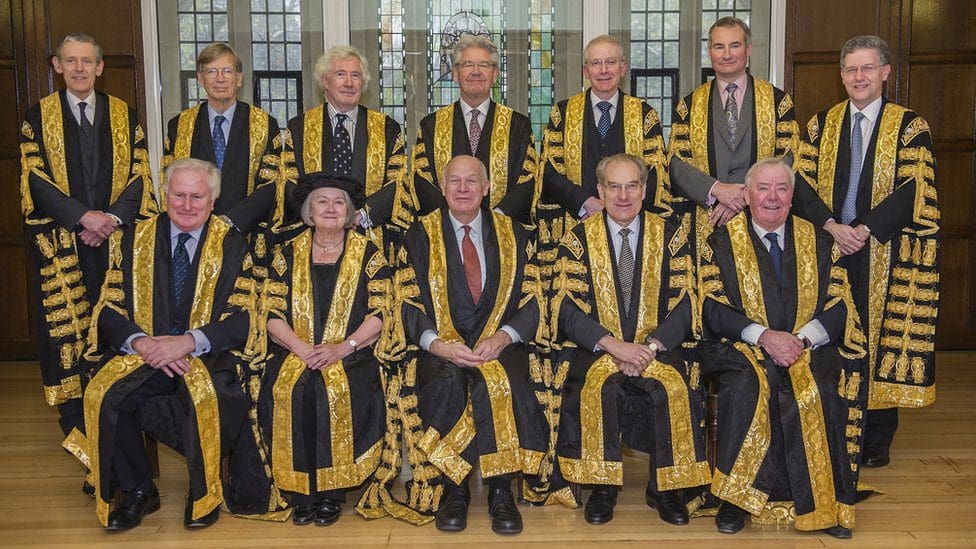

The New Bill of Rights is Another Example of Boris’s Lack of Backbone
The recently released Bill of Rights Bill is convoluted in its wording and drafting. It is overlong. It purports to remedy or correct the dominance of a ‘foreign’ convention and of overseas judges when the real problem, by orders of magnitude, is undue judicial power and the undermining of parliamentary sovereignty by the lawyerly caste. There are a few good bits to this Bill but on the whole it is a disappointment.
Let me explain by laying my sceptical cards on the table right at the start. I am no fan at all of any sort of bill of rights. In fact, one sideline in my academic career has been my longstanding attacks on bills of rights for their being thoroughly undemocratic in how they work. What they do, and Jeremy Bentham pointed this out over two centuries ago, is articulate a series of moral entitlements in the language of rights. And they do so in vague, amorphous terms. Put simply, they are sold up in the Olympian heights of moral abstractions (with hints of false absolutism) where pretty much all disagreements can be finessed. (Who, for instance, would say he or she is against ‘the right to free speech’?) But these instruments have real effect down in the quagmire of day-to-day social policy-making line-drawing calls. Where ought we to draw the line as regards hate speech? Campaign finance rules? Defamation? None of those is self-evidently obvious. Nice, smart, reasonable people simply disagree on all such line-drawing calls. So you can settle them by counting everyone equally, voting for an elected MP, and having them make the calls – until the next election when everything is up for grabs again.
Or, you can hand these specific line-drawing calls over to an unelected judiciary. These judges can answer them under the guise of pronouncing what our ‘rights’ are – as in how an abstract enumerated right in a bill of rights will be given life down in the quagmire of detail. And notice that when judges disagree they effectively vote; five judges’ votes beat four regardless of the quality of reasoning; the judges themselves use a thoroughly majoritarian procedure. All that differs is the size of the franchise. Nor, I’m afraid, is there any reason to think that the views of the median voter look anything like those of the median member of the lawyerly caste from which our top judges are selected. Many of these calls are political in nature and the sentiments one brings to the table matter. One can say they do not. But I believe they do. (And my exhibit number one, outside the bill of rights aegis, would be the two Brexit Miller decisions. A panel of Remainers is overwhelmingly likely to deliver different outcomes than a panel of Brexiteers, all professions of impartiality notwithstanding.)
So my view, set out by me in innumerable academic articles that you should look at next time you’re feeling a bout of insomnia, is that when you buy a bill of rights all you are buying is the views of the top judges. I much prefer the Diceyan unwritten constitution with parliamentary sovereignty at its heart, probably the most successful constitutional structure of the modern world (though the Madisonian ‘checks and balances’ US model gives it a run for its money).
That takes us to Britain’s Human Rights Act 1998, which was part of the Tony Blair package of constitutional reforms, virtually all of which were malign in my view. This is just a statutory bill of rights incorporated into the rights in the European Convention on Human Rights rather than an independent list of rights. And the trick to a statutory bill of rights – Britain copied the bones of the New Zealand statutory model if you want to know – is that it does not give judges the power to strike down or invalidate statutes the way it is done in Canada or the United States. In a formal sense, then, this retains parliamentary sovereignty. But these statutory models do have two very powerful operating provisions. One is a reading down provision which effectively says “you judges do everything you possibly can to read all other statutes in a rights-respecting way”. Read that statutory provision down, in other words, whenever you judges think the words used make that possible! The second key operative provision is a declarations power. The judges do not get to strike down laws but they do get to issue from on high a declaration that law X or Y is inconsistent with one or more or the enumerated rights. That, too, keeps us formally within the bounds of parliamentary sovereignty. In substance, though, things are very different.
I set those basics out because you need to know them to judge this new Bill of Rights. The existing Human Rights Act had an incredibly potent s.3 reading down provision. The U.K. top judges in a case called Ghaidan interpreted it to allow them to look at another statute and to read words in, implicitly to read words out, and to ignore the clear intention of the enacting Parliament. Go and look it up for yourself, that’s what they actually said. This is not really interpretation, is it? And that Ghaidan case has been affirmed and affirmed and affirmed some more. And during all the years of the Human Rights Act the judges have also issued dozens of declarations of incompatibility and every single time, bar one, the politicians have folded and given in to the view of the judges. (The one exception is on the question of prisoner voting.) All said, then, there are pro-bill of rights law professors who believe Britain’s judges are effectively as powerful as those in the US. That might be over-stating things. But not by much. So for me, as a dyed-in-the-wool majoritarian democrat, the gold standard would be to repeal the Human Rights Act and to withdraw from the European Convention. If you want sovereignty for your elected parliament so it can be untethered from juristocracy, overseas judges as well as domestic, then this is what is needed. Alas, it is not what this Bill of Rights delivers. There is not much bravery underlying what is being offered.
So be clear. The legislation before Parliament will not restore the British constitution to what it was before 1998. Instead, what it does is to tinker with the Human Rights Act using legislative drafting that is incredibly convoluted. The good news – and it is good news – is that the current s.3 reading down provision is to be repealed and not replaced. It will be gone. Remember, it licenses judges to do everything they possibly can to read any other statute in a way they, the unelected judiciary, think is rights-respecting – and look at the case law to see just how far the judges have pushed the “we think this reading of ours is possible” envelope. Hence this excision or removal is a good move. It aims to stop judges from pretending to be deferring to Parliament when they are in fact simply twisting and contorting statutory language and “ignoring its clear intention” right up to the point of what Lord Rodger called “judicial vandalism” in that Ghaidan case. So count this as at least a paper victory for judicial honesty. (That said, the sceptic in me worries this will not work. The very people, the judges, who have spent years using s.3 actively to undermine parliamentary sovereignty will have that particular tool taken away but will still have years of case law and years of this new pseudo-interpreting technique, all of which can easily be claimed now to be part of the common law approach. We will see.)
That said, and with those caveats, the good news largely ends there. The declarations power has been retained. Yes, this Bill limits the declarations power by putting in a prima facie requirement for the courts to accept parliament’s balancing decisions between policy aims and Convention rights. Yet as I noted, in theory the elected parliamentarians have always been free to listen to the judges declare that (in their view) some right has been infringed and then simply to announce that they, the elected branch, disagree. In practice, though, the empirical record is that the elected branches have rolled over virtually every time. I think that structurally it is difficult not to do so when one side has been tasked with issuing declarations about all of our fundamental rights (albeit by a vote of the judges) and the other is simply left with the permitted ability “to take these rights away”. In fact, both judges and legislators are simply disagreeing about where to draw highly debatable lines as regards how some amorphous rights entitlement ought to play out in the quagmire of day-to-day detail. So who knows if this attempt to cabin or bracket the declarations power will do anything? I would have repealed this power too. That, though, would have gutted the bill of rights. It would have seen the lawyerly caste up in arms. It would have taken real Boris bravery. But it would have been the right thing to do for anyone with my majoritarian and democratic sentiments.
I said above that this Bill is incredibly convoluted in its wording and drafting. This flows from trying, upfront, to guess how the judges might ratchet things up in future. This Bill does not make clear what rights would be enacted (the 1950 Convention rights, how they’re understood today, some ever-changing take on them?) nor whether they are locked in or can be ratcheted up. (Put differently, would this new Bill of Rights eliminate the ‘living instrument’ gloss that the European Court of Human Rights has superimposed since the late 1970s? Or not? What will the gravitational force be of the European case law? Again, who knows? Certainly the drafters of this Bill do not.) Relatedly, sort of, the Government is also trying to push the final interpretation of Convention rights to British, not overseas, judges. But as I said, that mistakes the problem. The problem is undue judicial power. If juristocracy and kritarchy come from on-shore, rather than off-shore, well, that’s not really a win is it? And there might even be reasons for thinking home-grown judges will be more activist, more likely to gainsay the elected legislature, than would the European Court of Human Rights (given where some of its judges come from).
So that, at heart, is the risk. It is that this Bill of Rights Bill will not in fact rein in the judges; rather it will empower the judges; they will just be British judges. And that flows from the underlying lack of fundamental purpose here by the initiators and drafters of this Bill. It reads as some sort of bastard-child-like compromise between Diceyan parliamentary sovereignty supporters like me, and some others engaged in a sort of rear-guard action to defend as much of the Human Rights Act as they can. In my view it is a badly missed opportunity and really not all that much to write home about. Another instance of Boris’s lack of backbone and lack of fundamental goals.
James Allan is the Garrick Professor of Law at Queensland University.






